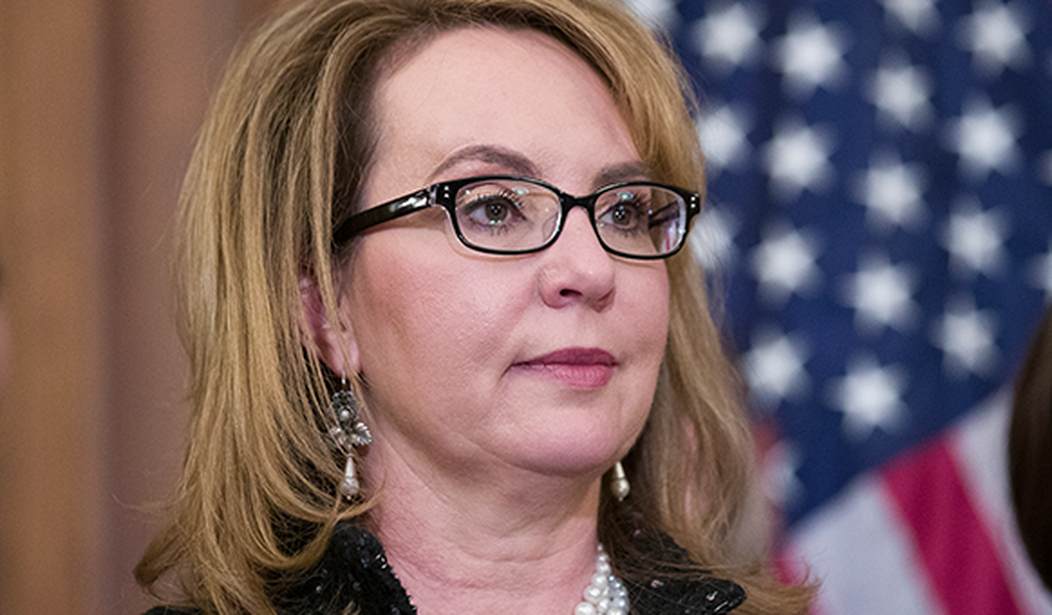I still stand by statement earlier today that unless we're ready to just give up on the American experiment, we shouldn't let our hearts become consumed with hate and we should try to find common ground with our fellow Americans, even if it's not on political terms. In that spirit, I wholeheartedly agree with Gabby Giffords when she says that public figures like Charlie Kirk and politicians like Melissa Hortman, Donald Trump, and herself have the right to speak their mind and vote their hearts without being the targets of political violence.
Almost everything else in Giffords new column at Time, however, deserves a rebuttal. Just like we've seen with Brady's Kris Brown, Giffords is perfectly comfortable exploiting Kirk's tragic death to demand new gun control laws, even if she can't actually say what gun law would have prevented Kirk's assassination.
What we share, and what puts all of us in danger—from elected leaders to little children, like those shot while praying in church in Minnesota a few weeks ago—is the overwhelming prevalence of guns in this country and the loopholes that make it appallingly easy for dangerous people to access them.
In America, we now have more guns than people. Many states take sensible steps—background checks, extreme risk protection orders, and safe storage laws—all policies that help reduce gun crime and gun deaths. Other states—like Utah, which year after year receives a F grade in the annual Gun Law Scorecard released by my organization, GIFFORDS—do far too little to save lives. Utah has expanded gun access in recent years, and gun deaths have increased along with that, soaring by 45% from 2014 to 2023, according to the CDC.
Utah's homicide rate was 2.18 per 100,000 people in 2023, well below the national average. Its suicide rate, however, is well above the national average; almost 21 suicides per 100,000 in 2023, or about ten times the murder rate. A little more than half of all suicides in the state involve a firearm, which I'd argue makes suicide a suicide issue, not a "gun violence" issue.
Giffords seems to suggest that if Utah had more restrictive gun laws, Kirk would still be alive today, though we know nothing about how the suspect acquired the bolt-action hunting rifle that was used to murder the conservative activist. We do know, however, that the organization Giffords founded has never explicitly called for a ban on bolt-action rifles. In fact, they took great pains to suggest that Giffords herself didn't mean what she said when she told a Time reporter that her goal was "no more guns".
If that's what Giffords believes Utah (or the United States) needs to do, she should exercise her First Amendment rights and say so. Instead, she offered this to Time readers:
It is physically very hard for me to speak due to my injuries from the bullets that hit me that day in January, and after watching yet another political shooting violently steal someone’s life before our eyes, it’s even harder to find words. So I want to speak plainly to my former colleagues in Congress, both the House and the Senate: Do something. Take action. Pray also if you want, but understand: your job is action. Nobody goes to the polls to elect someone to pray for them. We vote because we trust the people we elect will pass sensible, moderate policies that make our country a better, safer place to live and raise a family.
Just like Giffords disagreed with Charlie Kirk but acknowledged his right to speak, I disagree with her take but am firmly committed to the idea that she has the freedom to advocate for any gun control law she wants, even full repeal of the Second Amendment. But if she's going to use Kirk's assassination as a call to action, she should at least be intellectually honest enough to lay out what "sensible, moderate" policies would have stopped that assassination from happening.
Elsewhere in her Time column Giffords speaks more generally in favor of background checks on all gun sales, bans on "ghost guns" and requiring a license to own a gun. There's no reason to believe at this point that any of those laws would have prevented Kirk's assassination or the shooting at Evergreen High School in Colorado, which Giffords also referenced in her column. In that shooting, a 16-year-old student used a revolver to shoot two fellow students before taking their own life. He didn't legally possess that handgun, and none of Colorado's gun laws (including its universal background checks, ban on "ghost guns", and storage mandate) prevented him from illegally getting his hands on a gun.
The truly repugnant part of Giffords column, though, is her needless smear of "gun industry CEOs". Throughout much of her column, Giffords tries to find at least some common ground with those she disagrees with, but that came to an end when she discussed the firearms industry.
Come to the table, as Republicans and Democrats, to pass solutions to the epidemic of gun violence that’s killing both of us. There’s no shortage of policies with a history of bipartisan support: closing background check loopholes, supporting violence intervention programs, funding law enforcement—including the brave agents at the ATF who catch violent criminals and crack down on the small percentage of gun dealers who break the law—among many others. Above all: prioritize American lives over the donations and profits of gun industry CEOs.
This is just the continuation of a trend that began after United Healthcare CEO Brian Thompson was assassinated on a New York street. Ever since then, the organization that bears Giffords' name has gone out of its way to verbally attack and smear "gun industry CEOs", though this is the first time I've seen the smear appear in a piece with Gabby Giffords' byline.
Gabby Giffords has a right to her opinion. But if she's truly interested in "political violence and its toxic relationship to political rhetoric", then there's no reason for her dehumanize and depersonalize the men and women who work in the firearms industry, whether they're on assembly lines, in warehouses, or in executive suites. If she's not willing to recognize their humanity, then she needs to recognize her own contribution to the toxic nature of our political discourse.









